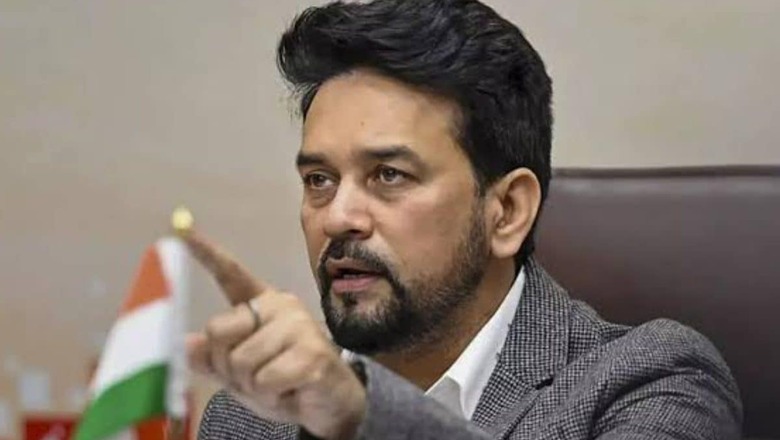
views
Anurag Thakur, Minister of Information and Broadcasting, urged the Indian media to be partners in PM Narendra Modi’s Viksit Bharat mission by 2047, as he spoke at the Storyboard18 DNPA Conclave and Awards 2024 on Tuesday.
He also urged media entities to engage in “reflection and self-examination to shield themselves from the perils of an infodemic”. Thakur added that fake news is a concern for not just the government, but also the news media.
‘THANKS TO DIGITAL PLATFORMS, NEWS ON INDIA’S PROGRESS IS REACHING THE WORLD’
“The past decade has seen an unparalleled surge in technology and digital media profoundly impacting every facet of our lives,” Thakur said.
“We are witness to the most significant technological advancement in human history. From the inception of the World Wide Web to the widespread usage of mobile phones, our journey through the 20th century to the 21st century has been nothing short of revolutionary. Today, we have transitioned from waiting months for a SIM card to the era of touch screens and PM Modi has been helping us with this transition through the years with a host of policies and initiatives. Be it UPI payments or DigiLocker, the list goes on,” the Minister said.
The Minister also credited the way journalists have been supporting the government to spread awareness on various subjects including policies, schemes and all other central initiatives. “We appreciate the way our journalists worked as Karma Yogis in the pandemic. While we were sitting at home, they were reporting from all corners of the country and spreading awareness. Journalists also played a very important role in the success of government initiatives like Swachch Bharat and others,” said Thakur.
मीडिया का काम खबर बताना है, खबर बनाना नहीं। pic.twitter.com/KnwGcMT3Tv— Anurag Thakur (@ianuragthakur) February 6, 2024
‘SELF-REGULATION DOESN’T MEAN LICENCE TO ERR INTENTIONALLY’
The expansion of media comes with a cautionary note, said Thakur. “Much of the media governance is self-regulatory. But self-regulation doesn’t mean licence to err intentionally. Media entities must engage in reflection and self-examination to shield themselves from the perils of an infodemic. Democracies worldwide acknowledge this challenge, but the real task lies in combating misinformation and the spread of an infodemic,” said Thakur.
The minister also touched upon recent milestones, such as the Press and Registration of Periodicals Bill that aims to replace the current Press and Registration of Books Act, 1867. “The Prime Minister has fulfilled his responsibilities; now, it is on the journalists to utilise the power of the pen to showcase India to the world. Continuous evolution, upgradation and reskilling are essential, coupled with the judicious use of technology,” the minister said.
“Difference in opinions is acceptable, but our commitment to Indianness should remain unwavering. I urge our friends in the media to be our partners in implementing the vision of Viksit Bharat by 2047,” he added.
‘SOME FOREIGN MEDIA ORGANISATIONS WORKING WITH ANTI-INDIA BIAS’
“Responsible, fair and balanced journalism should be practised, but unfortunately some foreign media organisations are working with an anti-India bias. Fabricated reports come out of these media houses that malign the country’s image as well as the image of credible media in the country. They must be identified and called out,” said Thakur.
“Our party, which is the Bharatiya Janata Party, upholds freedom of speech and the press autonomy and will continue to support it in the years to come, but journalists should focus on conveying news rather than creating it,” he added.
“The advent of digital platforms in India has facilitated the global dissemination of news about the nation’s progress. This should continue. Healthy discussions and debates are always encouraged and while differing opinions may exist, reporting should consistently adhere to fairness,” Thakur said.
“So we would suggest making best use of technology. The embrace of technology is instrumental, and we stand united in supporting policy formulation and implementation around it,” he said.
It was my pleasure to be part of the DNPA Conclave & Awards 2024, celebrating excellence in digital initiatives that have profoundly contributed to Bharat’s progress.Congratulations to all the winners, and my heartfelt gratitude to the organisers and jury members at… pic.twitter.com/FAPw7qjZy8
— Anurag Thakur (@ianuragthakur) February 6, 2024
‘ROBUST, DYNAMIC MEDIA ECOSYSTEM ESSENTIAL TO REALISE VISION OF VIKSIT BHARAT BY 2047’
Post the event, Thakur took to X to share his overall thoughts on the event and this digital era. “It was my pleasure to be part of the DNPA Conclave & Awards 2024, celebrating excellence in digital initiatives that have profoundly contributed to Bharat’s progress…Congratulations to all the winners, and my heartfelt gratitude to the organisers and jury members at Storyboard18 for their contribution in bringing to the fore and recognizing the pioneers in our digital journey, who have set global standards for innovation and excellence,” he wrote.
“In an era defined by technology, digital media plays a pivotal role in nation-building; creating awareness of the Government’s initiatives at the grassroots, providing credible content, and practising responsible journalism. Under the visionary leadership of PM Shri Narendra Modi ji, technology has become a tool for citizen empowerment and access to public services. The Government acknowledges the role of the media and its role in the transforming society. A robust and dynamic media ecosystem is essential for realizing the vision of Viksit Bharat by 2047. I also urge the media industry to embark on this journey, and together, let us shape a brighter future and an informed society,” he said.
‘CREDIBILITY OF NEWS, PLATFORMS AS IMPORTANT AS MONETISATION CHALLENGES’
The credibility of news platforms is at the forefront of the debate on quality content and difficulty in monetisation, said Thakur.
Acknowledging how monetisation models of digital news publishers do not align with the incentives big tech platforms put on speed, clickbait content and user engagement, Thakur said, “The challenge is not confined solely to the digital media space; it extends to print and television as well. Whether it’s the urgency of breaking news on television or updates on various other platforms, the common thread is the need for effective regulation and self-regulation.”
“Print, TV, and digital all work on self-regulation. While we are open to considering any suggested policy changes, it’s crucial to recognise that the responsibility for credible news is shared by players of all sizes. It is unfair to assume that smaller entities are less responsible compared to the larger ones because they have less stake involved,” he said.
The minister also highlighted the crucial issue of monetisation difficulties and how foreign companies operating behind opaque algorithms pose a challenge for the digital news publishers. “We are coming up with policies that will address the digital advertising issues and ensure no revenue loss happens,” the minister assured.



















Comments
0 comment